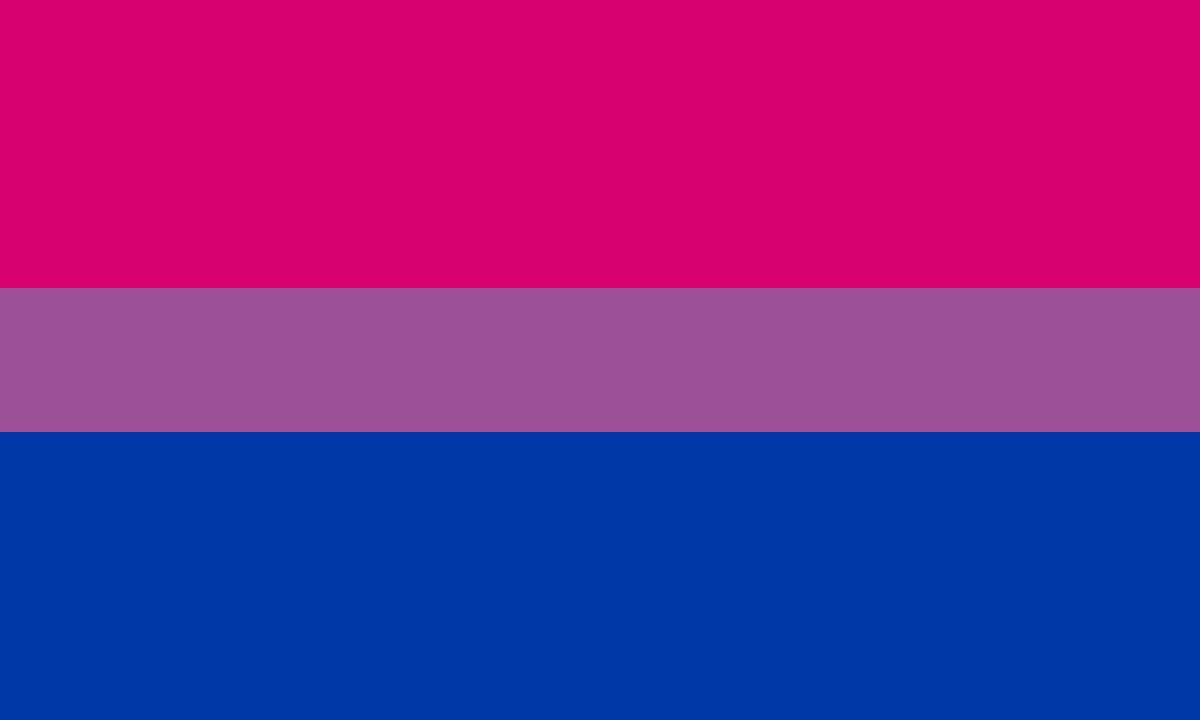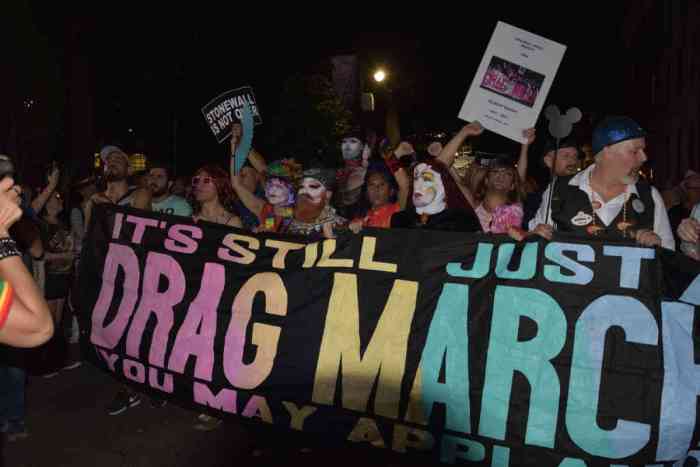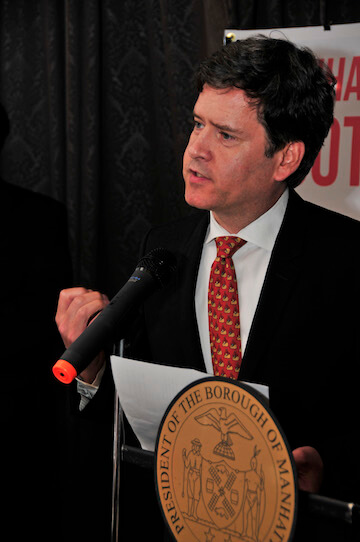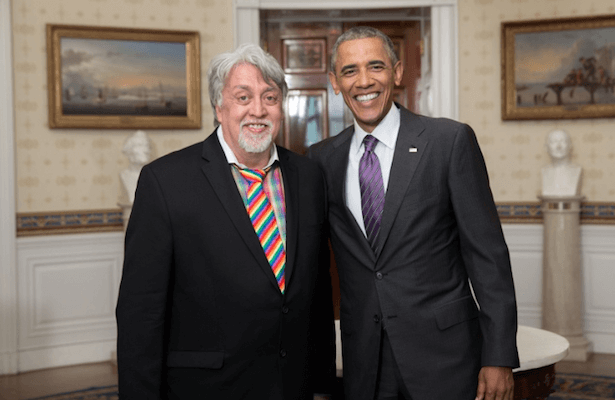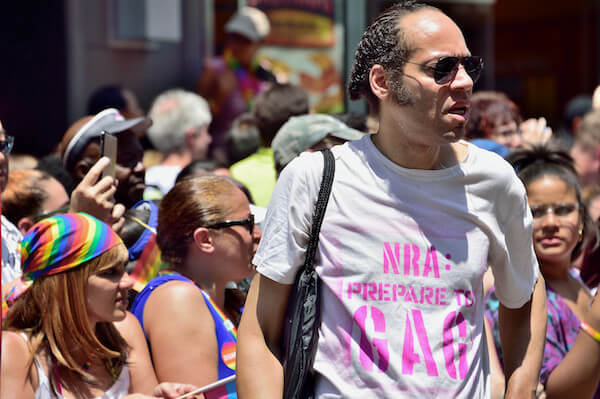BiNet USA, a longstanding online community of bisexual individuals, is embroiled in controversy after the organization fired off a series of Tweets claiming ownership of the Bisexual Pride Flag and threatening those who display the flag on their own pages, igniting new discussions about the commodification of Pride.
“The copyright of the flag is solely BiNet USA’s,” BiNet USA’s account wrote in April 29 tweets that are no longer online because the organization’s account was subsequently deleted. “It does not belong to one founder and no founder can approve its use without the President and/ or board approval.”
The organization also began directly calling out those using the flag, including bi activist Jayne B. Shea, who featured Bisexual Pride Flags during a recent virtual event.
“Hi JayneBShea,” @BiNetUSA wrote in a tweet on April 29 directed at Shea. “We at BiNet USA are asking you to get in touch so we can discuss your use of the bisexual pride flag without any money going to our organization. Thank you for removing the flag from your site, socials or work. We know this is a lot so we hope we can work a new deal.”
In another tweet, BiNet USA wrote, “So if you’re using the bi pride colors, or any @BiNetUSA work, please remove them from your website before we send a legal letter advising same. cc: @BRC_Central.”
BiNet USA faced widespread criticism for the unprecedented assertion that it owns copyright of the Bisexual Pride Flag, which was created by Michael Page in 1998. Monica Helms, who created the Trans Flag after Page encouraged her to do so, voiced criticism of BiNet USA’s claims in an interview with Gay City News, and a close friend of the late Gilbert Baker — who created the LGBTQ Pride Rainbow Flag — also pushed back against BiNet USA’s actions.
BiNet USA, which is led by president Faith Cheltenham, did not respond to multiple questions from Gay City News about the organization’s ownership claims, its role in the origins of the flag, why the Twitter account was deleted, or why claims of ownership are only popping up now — in the middle of a coronavius pandemic that has crushed the economy.
But in a long statement on BiNet’s Facebook page on April 29, Cheltenham said her words have been miscontrued and asserted that the group is focusing its copyright gripes toward for-profit re-sellers that she believes have a resopnsiblity to raise money for bisexual individuals.
In one Facebook comment exchange, Cheltenham was asked by Tommaso Mori whether she has signed proof from Page stating that he offered full copyright of his work.
“To be very clear he asked me personally to see what I could do to remove his name from being the creator of this flag cause he said he wasn’t,” Cheltenham responded, before adding, “like maybe he was the first to have the idea and he certainly sold it on his store but he says other BiNet organizers helped and picked flag colors, flag size, and dimensions. I told him I’d do what I could but that white bisexuals would probably yell a great deal and I’d need to come back to him and get him to say it for himself.”
Mori then wrote, “Legally it doesn’t count and it’s still your word against previous written declarations by Michael Page.”
Mori’s response drew 20 likes.
Following the tweetstorm, Shea announced she was addressing the issue with her legal counsel, some board members of BiNet USA distanced themselves from the organization’s actions, and queer people in general were expressing outrage that any Pride Flags would be owned by anyone or tied to financial compensation.
The issue exacerbated existing frustrations that Pride has become too commercialized less than a year after that issue reached a boiling point in New York City, where the shadow of corporate influence in the New York City Pride March prompted the emergence of an alternative, corporate-free Queer Liberation March on the same final Sunday in June.
Ironically, Cheltenham defended her organization’s actions by claiming that she, too, has called to “reclaim Pride,” while also arguing that bisexual individuals have suffered while corporations have profited off of Bisexual Pride.
“This BiNet USA shitstorm is an excellent example of how folks can wield and warp social justice language as a smokescreen for behavior that is absolutely not aligned with the values and interests of the communities they claim to serve,” Sam Dylan Finch, an out bisexual editor at Healthline, wrote in a tweet.
Signs of friction within BiNet USA were evident on social media, where a board member, Lauren Beach, issued a statement on April 29 after the organization landed in hot water.
“Though I am a BiNet board member, I was not consulted about the decision to state that BiNet had trademarked/ others must license the flag,” Beach wrote on Twitter. “I want to clarify these are the views of #BiNet President @thefayth, who also was the person tweeting this content earlier today from the now-defunct BiNet twitter. I do not share the view that #BiNet owns or should seek to license the #bisexual pride flag. #BiNet board members are in dialogue with @thefayth. We will issue a statement soon to clarify #BiNet’s views and identify next steps to address the hurt and confusion that have emerged in #bisexual+ communities in response to today’s tweet.”
A statement had yet to appear on social media as of the evening of April 30.
BiNet USA has some ties to the origins of the Bisexual Pride Flag, but the extent of those ties are murky. Page is listed on the byline of an archived BiFlag.com article stating that he came up with the idea of a Bisexual Pride Flag at a time when he was volunteering with BiNet USA. It does not, however, state that he came up with the flag in his capacity with BiNet USA.
In that article he said the “flag is for free public usage” and “The Bi Pride Flag is the only bisexual symbol not patented, trademarked, or service marked.”
Monica Helms, who invented the Trans Flag, is casting doubt on the very possibility that a flag could even be trademarked. She told Gay City News in a phone interview April 30 that she looked into the possibility of obtaining the rights to her own flag but was told that it is not possible to copyright or trademark a flag.
“This thing that BiNet is saying is BS,” Helms said. “They don’t have any kind of copyright on it. If they tried to go to court, they would lose. They don’t have any proof.”
An image of the Bisexual Pride Flag on Wikimedia Commons lists Page as the author and the licensing section of that page states, “This image of simple geometry is ineligible for copyright and therefore in the public domain, because it consists entirely of information that is common property and contains no original authorship.”
Helms has a unique connection to both BiNet USA and Page. She met Page in 1999 when she was serving as a co-chair of BiNet, and it was around that time, she said, that Page encouraged her to create a flag for the transgender community. Helms has since lost touch with Page, but she stood up for his original vision of the Bisexual Pride Flag and pushed back against BiNet’s claims.
“When Michael made [the Bisexual Pride Flag], he said it was for the bisexual community,” Helms said. “It had no copyright, no trademark, no nothing. The Bi Flag has been public domain for more than 20 years now.”
Contact information for Page was not immediately available.
Helms, who eventually left BiNet after she came to terms with her sexuality and realized she was only attracted to women, described the organization as one that has shrunk over the years and is primarily driven only by its president, Cheltenham.
Charley Beal, who is the president of the Gilbert Baker Foundation and helped manage Baker’s estate up until this past December, echoed Helms’ sentiments in an email to Gay City News.
“Like Gilbert Baker’s creation, the Rainbow Flag, it is something that is owned by the people,” wrote Beal, a close friend of Baker’s. “You cannot copyright a flag anymore than you or I could if we tried to claim ownership of the American flag.”
He added, “As the creator of the flag, Michael Page could have filed a copyright for the design of the flag as a ‘work of art’ but not as a flag.”
Beal also tore into BiNet USA directly, saying he suspects that “this is some sort of foolish money grab by BiNet USA and I would be very interested to see how this plays out in court, if it gets that far.”
He added, “Frankly I find it deeply upsetting that anybody would try to make a profit off of an icon that an oppressed minority looks up to as a symbol of liberation. Liberation should never have a price tag.”
Baker was tireless over four decades in his happy volunteer efforts to promote the Rainbow Flag and adapt its use for a wide variety of community occasions and endeavors.
To sign up for the Gay City News email newsletter, visit gaycitynews.com/newsletter.

